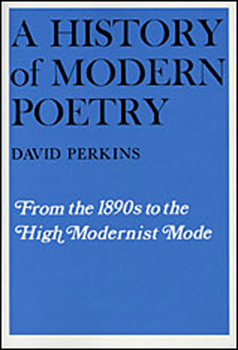A History of Modern Poetry
Select Format
Select Condition 
Book Overview
The first comprehensive history of modern poetry in English from the 1890s to the 1920s, this book embraces an era of enormous creative variety--the formative period during which the Romantic traditions of the past were abandoned or transformed and a major new literature created. By the end of the period covered, Eliot's The Waste Land, Lawrence's Birds, Beasts and Flowers, Stevens's Harmonium, and Pound's Draft of XVI Cantos had been published, and the first post-Eliot generation of poets was beginning to emerge.
More than a hundred poets are treated in this volume, and many more are noticed in passing. David Perkins discusses each poet and type of poetry with keen critical appreciation. He traces opposed and evolving assumptions about poetry, and considers the effects on poetry of its changing audiences, of premises and procedures in literary criticism, of the publishing outlets poets could hope to use, and the interrelations of poetry with developments in the other arts--the novel, painting, film, music--as well as in social, political, and intellectual life. The poetry of the United States and that of the British Isles are seen in interplay rather than separately. This book is an important contribution to the understanding of modern literature. At the same time, it throws new light on the cultural history of both America and Britain in the twentieth century.Format:Paperback
Language:English
ISBN:0674399455
ISBN13:9780674399457
Release Date:May 1979
Publisher:Belknap Press
Length:640 Pages
Weight:1.55 lbs.
Dimensions:1.7" x 5.5" x 8.2"
Customer Reviews
3 ratings
Accessible to NonPoets
Published by Thriftbooks.com User , 22 years ago
I love poetry. Books like "History of Modern Poetry: Modernism and After" fill my bookshelves. I eat this stuff up. But one thing a lot of poetry books do is mush up the sense of it all in the hope of appealing to the academics. Since most regularly published poets are professors in English departments, it works out, but it creates a great divide between the laity and the academic.What David Perkins has done is explain the basic chronology of poets periods. This is neither an encyclopedia of terms nor an anthology of great poems. Instead, Perkins takes a period, affiliates the poets major within that period and explains their context and importance.He keeps it simple without talking down to the reader.Essentially, it is a collection of intelligent essays. Some are topical, like "The Postwar Period" while others are poet-specific, like "W. H. Auden."Perkins writes clearly. It isn't trying to impress you, but he is trying to help you understand Eliot and onward.I read it for personal growth, but it would make a solid textbook, in tandem with Perkins' other volume covering the previous eras.I fully recommend "History of Modern Poetry: Modernism and After" by David Perkins.Anthony Trendl
A Must Have for Serious Readers of Poetry
Published by Thriftbooks.com User , 22 years ago
This book (the first volume) is over 600 pages. And they are 600 pages chock full of intelligent analyses and overviews of all the poetic schools in Britian and the US since the 1890s. This book is fascinating in its content and a joy to read because of Perkins' clear and humane style. It is amazing that one person can know so much. But don't let that intimidate you. This book will do wonders for your working knowledge of American and British poetry.
excellent introduction to modern poetry
Published by Thriftbooks.com User , 26 years ago
David Perkins's "History of Modern Poetry" gives the reader the essentials of the modernist movement, from its beginnings as a reaction against the outworn Romantic era to the poetry of Ashbery, Ammons, and Merrill in our own age. Brevity is a virtue here: Perkins states the essentials of a poet's life only and so escapes the common error of overinterpretation which most critics commit. The series also pays attention to minor poets who do not rank highly today and past movements in journals and anthology editing so as to provide us with a complete picture of what the past century of poetry has consisted. Highly recommended.





